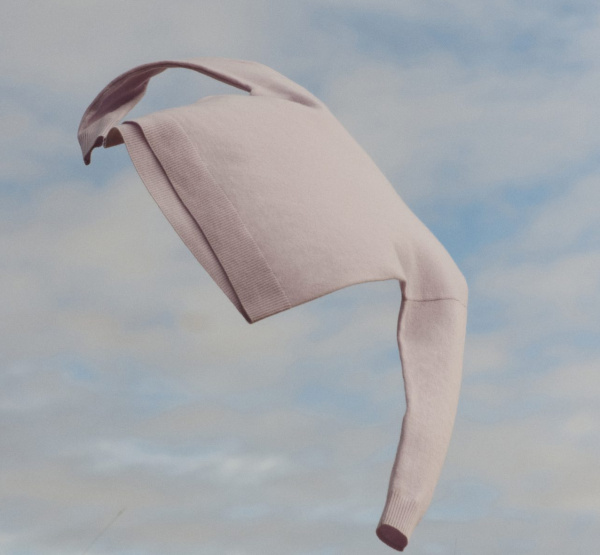
Country Road Our World Campaign
- Fashion
Falling in love with sustainable knits
Winter cashmere, wool, sustainability and you
In partnership with Country Road
Baby, it might be cold outside, but before you hit ‘add to cart’ to top up on your winter wardrobe, let’s look at why it’s important to trace where your knitted essentials are coming from.
We are all becoming increasingly conscious about the impact our purchases have on the environment and its people. But while supply chain traceability is key to supporting better working conditions and improved environmental impact, according to the 2021 Ethical Fashion Report by Baptist World Aid, only 28 per cent of companies in Australia know where at least half their raw materials are from. It’s alarming really. But equally, it highlights the responsibility of change falls on us, as the consumers and the commentators, just as much as the brands themselves. Understanding the impact of materials like cashmere and wool, is one way we can make more sustainable purchases and for the overall sustainability matrix.

Applying traceability to cashmere
In recent years, the demand for cashmere has risen sharply, however, little is widely known about where cashmere comes from and under what conditions it’s produced. Nevertheless, as with any other raw material, traceable and sustainably certified cashmere will be the cornerstone of the cashmere supply chain of the future.
“The need for a sustainable, certified alternative to conventional cashmere is enormous – not least caused by animal welfare organisations and changing consumer behaviour,” says Tina Stridde, Managing Director, The Good Cashmere Standard®. “More and more people are paying attention to animal-friendly clothing, as a recent study by the international animal welfare organisation Four Paws shows. According to this, almost a third of those surveyed consciously look for clothing that takes animal welfare standards into account. Stakeholders throughout the cashmere value chain need to respond to this growing demand if they are to ensure their future success and want to drive positive change.”
The Good Cashmere Standard® (GCS) is an independent standard for sustainable cashmere, developed by the Aid by Trade Foundation (AbTF), that aims to improve the welfare of cashmere goats, the working conditions of farmers and to protect the environment. Becoming a partner of GCS requires a long-term commitment, and like all good partnerships, collaboration.
“Collaboration cannot be underestimated to achieve progress in terms of sustainability and traceability. (It) serves as a cornerstone to achieve change. The Good Cashmere Standard was developed in collaboration with animal welfare specialists and industry experts. Since its launch in 2020, our network of partners includes representatives from diverse branches such as animal welfare organisations, retailers, industry leaders and producers across the textile value chain that meet regularly to find solutions that create lasting effects,” explains Stridde.
This winter Country Road – the first Australian fashion retailer to join GCS – is rolling out a select range of The Good Cashmere Standard® certified product, with cashmere responsibly sourced from Inner Mongolia. By purchasing these products, customers are supporting the responsible farming of this luxury fibre, which includes promoting animal welfare, securing a sustainable source of income for farmers, and protecting the biodiversity of the land on which the goats and farming communities’ lives.
“We are proud to be the first Australian fashion retailer to partner with the Good Cashmere Standard®,” explains Fabia Pryor, Brand Community and Impact Manager for Country Road.
“Partnerships like this take time and investment, and, when introducing a standard that’s new to market, also require customer education. We’ve started with a select range of Good Cashmere Standard® certified products and look forward to expanding that over time. This is another important step in our good business journey.”

Country Road champions single origin Merino Wool

Which leads us to single origin Australian wool
Country Road’s Single Origin Merino collection is sourced from Beaufront Station, a Responsible Wool Standard certified farm owned by the von Bibra family in Tasmania.
The Responsible Wool Standard is a voluntary standard that addresses the welfare of sheep and the land they graze on. It ensures that wool comes from farms that have a progressive approach to managing their land, practice holistic respect for animal welfare of the sheep and respect the freedoms of animal welfare; and ensures a strong chain of custody for certified materials as they move through the supply chain. And it’s a verification that benefits the consumer and the retailer, just as much as the farmer.
Your conscious purchases directly impact the farm
The von Bibras are what some might call farming royalty. This family of generational farmers have a passionate commitment to wool and conservation that goes beyond the boundaries of the sprawling farm situated in Ross, near Launceston in Tasmania. And it’s here, on their Responsible Wool Standard certified farm, where they produce Tasmanian Merino wool to meet the consumer demand for fully traceable, ethically produced natural wool fibre; that’s used in Country Road’s Single Origin Merino collection.
To be Responsible Wool Standard certified “is a way of ensuring for our customers that we have accountability, best practice farming and systems in place that deliver on our commitment to our animals, land and community,” explains Julian von Bibra, farmer, and land conservator.
“As farmers we see our role as custodians and caretakers. Over time we have come to understand the generations of careful land management that has shaped this landscape and we wish to nurture this legacy. Much of our land has high conservation values, rich in biodiversity. Carefully managed, our Merino sheep can have minimal impact and we can protect and enhance this ancient landscape.”
This family of farmers have always sought to improve, learn and listen. And because their vision is generational, – they love what they do and where they live – they produce an amazing product. “A woollen garment is sourced from a wonderful natural fibre. Being able to tell this story and link the finished product back to a farm and flock of sheep is an extraordinary opportunity. The customer can be taken on a journey and better understands how special Merino wool is,” says von Bibra.
Equally, by aligning their farm with Country Road, the von Bibras get a sense of pride from knowing their customer has an expectation around how they manage their land, animals, and people. “Country Road is an iconic Australian brand. By sourcing quality materials from Australia shows leadership and commitment to supporting local initiatives. It reinforces that what we believe in is aligned with our customers. We all become connected and engaged,” he says.

Talking about traceability
Dedicated to transparency, Oritain takes a scientific approach to determine where the fibre in a garment originates. In 2018, Country Road was the first Australian fashion retailer to partner with Oritain and are currently able to verify the origin of cotton and wool fibres in selected Country Road ranges. This means fibres can be scientifically traced back to the farms they came from. The Oritain verification is a symbol that demonstrates the power of science in protecting the integrity of a garment. Country Road ranges that are labelled ‘verified’ have undergone independent scientific sampling and analysis by Oritain.
Moving in the right direction
While the tide of change takes time, over the past three years three in five Australian consumers (62%) have become more aware of the impacts of their purchasing decisions, while 42% agree that they will change their consumption habits to be more ethical in the next twelve months. It’s education in areas like verified materials that will help bridge the gap between our current shopping habits, those we hope to aspire to, and an environment that thrives.
RELATED: How eco-friendly is your favourite fashion brand?
RELATED: Game, sweat, match: ethical and sustainable activewear you’ll love
